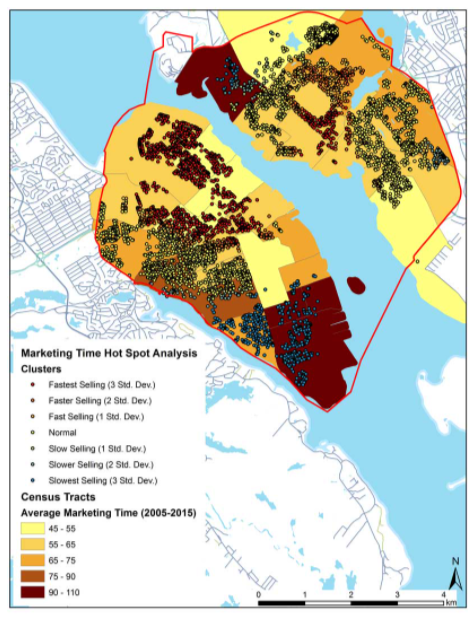Property tax is by far the most important source of revenue for municipalities in Canada, accounting for 49.5% of revenue in 2008 with an annual average growth rate of 1.6% (1988-2008). As reliance on property tax increases, so does the complexity of administering this regressive but necessary evil. Increased computing power in the mid-1960s prompted a shift towards automation of property tax systems, beginning with simple tasks and culminating in today’s fully automated assessment, notification, and payment systems. Modern Automated Valuation Models (AVMs) allow for rapid processing of data with minimised human-bias… but (and this is a large but) real estate appraisal is a nuanced trade: reducing the role of Appraiser to AVM Technician can have significant negative repercussions.
Service New Brunswick’s ongoing cleanup of their attempt at an AVM is a prospective case study in the dangers of a “hands-off” approach to the valuation process. Massive value errors were created by a computer-driven system with insufficient checks in place to alert users to suspicious results. When reviewed by human appraisers many of the shockingly incorrect valuations were easily overturned based on traditional market comparison valuation. Autopilot replaced the flight crew and actual appraisers are left cleaning up the crash, while their political and bureaucratic colleagues deal with the rightful public outcry.
While seemingly seductive, potential time and cost savings offered by an AVM should never mask the fact that, in order to operate successfully, an AVM must integrate human expertise throughout the valuation process. At Turner Drake the “A” in our in-house AVM stands for Accelerated to reflect the role that expert opinion plays in our two-stage computer-assisted mass appraisal model. Stage One combs through real property sales to select comparable properties based on locally relevant, value-defining attributes such as size, location, and design. Stage Two adjusts and weighs a unique set of comparable sales to create a market-based value estimate for each subject property in an assessment area. Throughout each stage of the model, a professional appraiser defines the selection criteria and adjustment values for comparable properties based on market evidence and local expertise. The model does the heavy lifting but certified appraisers evaluate and refine the results.

Outliers – which no system can avoid – can wreak havoc on the results of an AVM unequipped to handle the inherently diverse nature of real estate. It is critically important to flag potential outliers for review so the model can be adjusted for future assessments. During the initial rollout of an AVM model, refinement is time consuming but absolutely necessary for creating reliable, equitable assessments in successive years. In developing our Accelerated Valuation Model, we put the time in up front so the system flags out of the ordinary results, and the professional appraiser, made aware of the potential issue, is able to quickly and easily account for them.
In a Case Study of condominiums on the Halifax Peninsula, the Turner Drake AVM out-performed PVSC assessment values by a margin of up to 45%. That is, 86% of TDP value estimates were within 5% of an actual time-adjusted sale price versus PVSC’s 41% and 98% of TDP values were within 15% of actual sale price versus PVSC’s 84% in the same pool of properties. Our combination of custom programs and a traditional direct-comparison valuation can produce a list of unique comparables with adjustments for 1,000 properties in about two seconds.
Property tax administration systems are as diverse as the municipalities they serve and every region relies to a degree on the convenience of computers and automation. However, no matter the size or complexity of a property tax system it is important to follow best practices, and learn from the success – or failure – of others. When the pursuit of speed comes at the expense of quality there is a significant risk to the accuracy of valuations and the credibility of the property tax system as a whole.
For more information on how our AVM can benefit you, call James Stephens at 902-429-1811 ext. 346 or email
